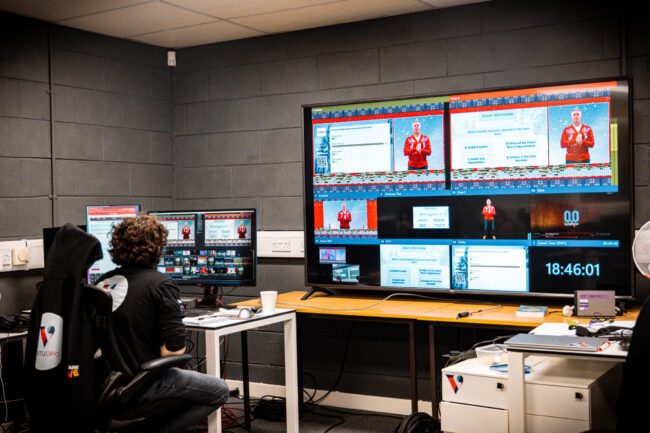A virtual conference is very different to other types of events, bringing a unique set of benefits and challenges.
We’re bringing you an insider’s guide to running a successful virtual event. We’ll also be exploring the benefits of hosting virtual rather than in-person or hybrid events.
Skip Ahead:
What is a Virtual Event?
5 Benefits of Virtual Events
Tips for Hosting a Successful Virtual Event?
Example of a Virtual Event
What is a Virtual Event?
A virtual event allows people to connect online using platforms such as Zoom or Microsoft Teams. They provide businesses with a great alternative to in-person events and offer attendees a unique virtual experience that is proven to increase audience engagement.
The most popular types of virtual events include:
● Town halls
● Conferences
● Webinars
● Trade shows and expos
● Product launches
● Training
● Networking events
Hosting a virtual event is a great way for businesses to improve communication, boost staff retention and increase sustainability.
5 Benefits of Virtual Events
Accessibility
One of the major benefits of hosting events virtually is greater accessibility as audiences can participate from anywhere in the world. This means location is no longer a barrier to attending an event, which can be particularly beneficial for large organisations who often favour the virtual format for conferences and town halls. Virtual events can help cultivate a level of company-wide engagement that wouldn’t be possible with other types of events.
According to a recent survey by vFairs, almost 80 percent of event planners sited ‘ease of attendance’ as their main reason for considering a virtual event.
Virtual events take away many barriers for participants, meaning hosts are more likely to see increased attendance compared to in-person events The majority of online event platforms can be joined using a mobile phone, tablet, laptop or desktop computer, making events easily accessible to a wider audience.
The virtual format also offers a more inclusive attendee experience compared to in-person events, as anyone with additional needs can benefit from technologies such as closed captions, text-to-speech, sign language interpreters and more.
Sustainability
Hosting an event virtually can be a more sustainable business practice, as the format greatly reduces the environmental impact that comes with in-person events, which typically require resources such as electricity, heating, air conditioning and printed materials as well as catering. What’s more, virtual conferences completely remove the need to travel so there is no contribution to carbon emissions, helping to align with the social responsibilities of modern businesses.
Cost Efficiency
Hosting a traditional event can be an expensive endeavour, with costs quickly adding up for venue and equipment hire, stage design and catering services. However, the cost of running a virtual event is much lower and the format can reach a much wider audience, resulting in a greater event ROI.
Audience Engagement
Virtual experiences can offer a higher level of engagement among attendees, with more scope to introduce interactive elements and gamification. Easy ways to make audiences feel more involved during virtual meetings and events include chat rooms, surveys, Q&A sessions and even scavenger hunts.
Breakout sessions are also a great way to encourage discussion and provide users with an opportunity for attendee-to-attendee networking. This virtual event technology is readily available and is often built into popular hosting platforms.
Data and Analytics
Detailed data and analytical breakdowns are readily available through most platforms and can be invaluable for evaluating the success of a virtual event. Metrics such as demographics, registration numbers and email click-through rates can play an important part in the evaluation process. The wealth of data available can be used to track attendance in real-time, provide an insight into audience engagement and help with future event planning.

Tips for Hosting a Successful Virtual Event
Engage your Audience
Audience engagement is key when it comes to virtual event success. Consider using a variety of formats from presentations and panel discussions to Q&A sessions and interactive activities to help grab the attention of your audience and keep them hooked. It’s a good idea to introduce a mix of multi-media elements such as videos, graphics and animations to enhance the overall event experience.
Tools such as Slido can be a great way to facilitate interactive polls and quizzes and can be
easily integrated into your virtual event.
During the planning stages, it’s vital to tailor your event content to suit your target audience, taking into account factors such as age, education and religion. Make sure your content is designed to resonate with your audience and be sure to choose the right technique to drive engagement with your target audience.
Create a User-Friendly Experience
It’s important to make sure participants have a seamless and user-friendly experience. This can be achieved by clearly communicating instructions on how to join the event, navigate the platform and participate in activities.
Setting up technical support to address any issues that may arise during the event is also good practice and will help the overall event run smoothly. Consider offering tutorials or guides for participants who may be unfamiliar with the virtual platform.
Preparation
The most effective way to ensure your virtual event is a success is to allow adequate preparation time. Most of the common pitfalls of hosting a virtual event can be avoided by allowing enough time to conduct thorough technical checks, speaker briefings and rehearsals.
Important technical checks include testing equipment and software to ensure all audio and visual elements are working properly, as well as making sure any interactive features are operating as they should be before the event begins.
A major factor in virtual events is bandwidth, this is because an inadequate internet connection can hugely impact the event, affecting the video quality output and it can make the stream jumpy. Any major issues will likely lead to a poor user experience, and result in negative audience feedback, so it is best to plan ahead.
Another important part of the preparation for a virtual event is rehearsing with presenters or hosts to ensure they are familiar with the virtual event platform and tools that they will be using during the event. It’s also important that you provide potential attendees with all relevant information on how to join your virtual event.
Marketing your Virtual Event
Developing a marketing strategy for your virtual event is essential for attracting attendees and generating interest ahead of your event. Consider your target audience and the type of event you are hosting, and identify what platforms you should aim to target.
Social media platforms can be a great promotional tool that can give your event traction and build anticipation for the attendees. Consider creating short-form video content for social media platforms such as Instagram, TikTok, Twitter or Facebook, which can be great for catching the attention of audiences.
You could even use an event hashtag and encourage participants to create user-generated content. If you have a marketing budget for your event, paid social media advertising can also be an effective way to reach your target audience.
Data can be gathered from social media posts to help gauge how audiences are responding to your content, with social media engagements such as follows, likes, comments and shares providing a useful indication of anticipation and interest levels in the event.
Email reminders can also be a good way to promote your event to people who don’t use social media platforms, especially if your event is more corporate-orientated and aimed at business professionals.
A strong marketing strategy is essential to help drive event registrations and increase the profile of your virtual event.
Post-Event Follow-Up
Encouraging attendees to complete a feedback survey can provide a useful insight into the overall success of your virtual event. This information can be extremely useful when it comes
to planning future events.
Sending a post-event survey on email is a great way to keep the conversation going with attendees after your event. It also shows your attendees that you are interested in their feedback. Data from a post event survey allows you to assess your event from the audience’s perspective and refine future event content to help improve the user experience.
Example of a Virtual Event
BSG – Educational Stream
Virtuopo hosted an educational stream for the British Society of Gastroenterology. The aim of the virtual event was to inform, educate, and engage a live remote audience.

The show included panel discussions between keynote speakers and remote callers from all over the world, with audience participation including a live Q&A session. The event was a huge success, receiving positive feedback from both the client and attendees.
Law Firm Virtual Christmas Quiz
At the end of 2023, we had the pleasure of hosting a virtual quiz as part of a well-known law firm’s Christmas celebrations. The event was streamed from our brand-new in-house studio as hundreds of participants took part from the comfort of their own homes. The presenter did a fantastic job of keeping the audience engaged as we broadcast the entire live interactive show.

Our client’s goal was to provide an exciting and engaging virtual experience for employees to come together to mark the end of a successful year. The whole event was centred around audience participation and attendees were encouraged to compete against each other in scavenger hunts, answer questions on Slido and chat with the presenter.
The green screen enabled studio at Virtuopo allows us to capture high-quality audio and visuals, as well as build virtual environments to use as a backdrop. The latest green screen technology brings limitless creative capabilities to our client virtual events.
Conclusion
Overall, virtual events are a great way to connect people without the need to travel. There are many business benefits associated with running regular companywide shared experiences and interactive virtual events.
While it can take a lot of planning and technical expertise to host an interactive virtual event, the increased level of engagement and attendee satisfaction is well worth the effort.
Hiring a professional live streaming company is the best way to deliver a successful virtual event and partnering with a specialist like Virtuopo means you will avoid any potential technical difficulties. A good live streaming company will bring expert knowledge to your virtual event, providing guidance on event content, as well as the technical know-how to ensure a high standard of production quality every time.
Here at Virtuopo, we pride ourselves on delivering high-quality and reliable virtual event management for a wide range of clients. If you would like to find out more about our services, please contact us on 0151 662 0275 or email info@virtuopo.com.





